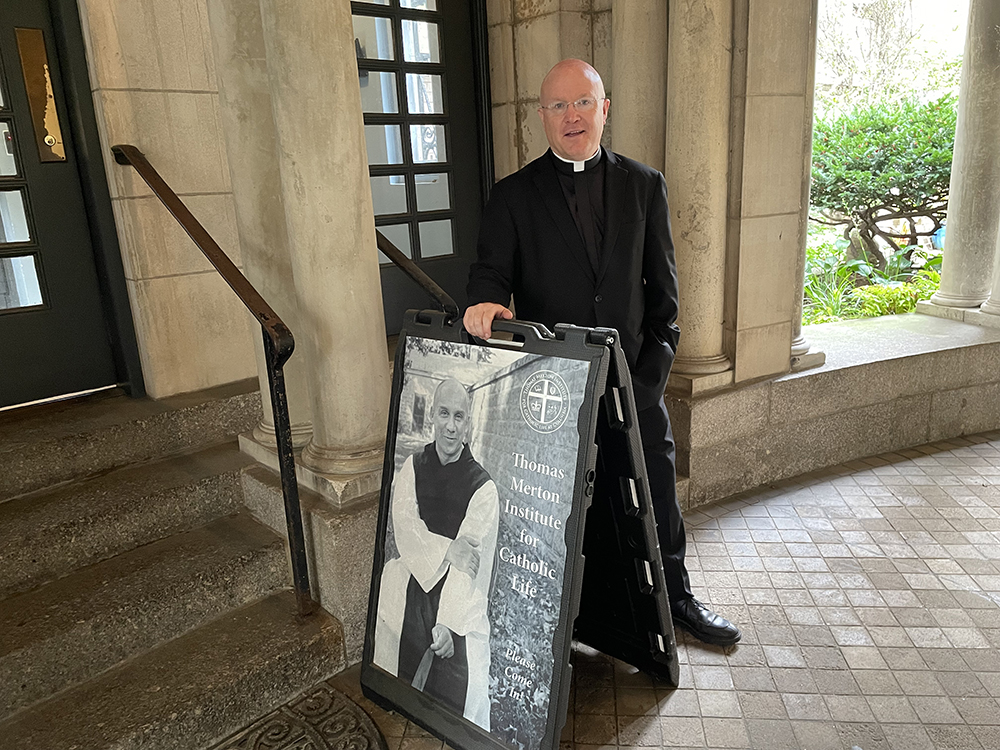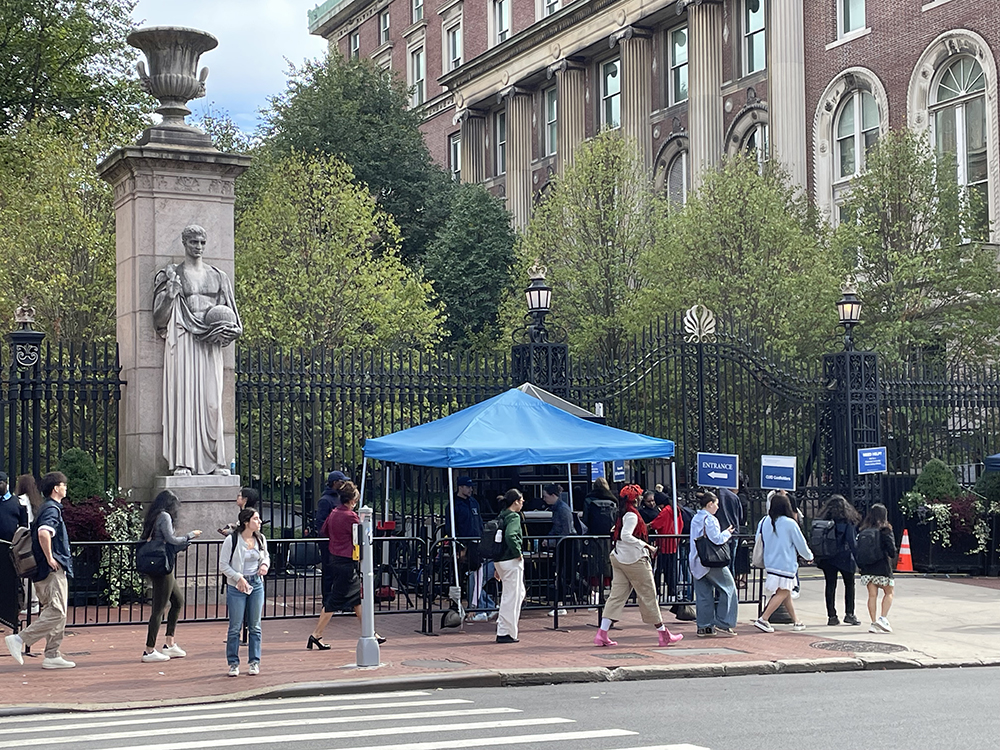Campus security measures are in place at Columbia University. Students and faculty must pass checkpoints to enter the campus through the main gate on Broadway and 116th Street. (Photo: Paula Katinas)
COLUMBIA UNIVERSITY — As the first anniversary of the Oct. 7 Hamas attack on Israel approached, there was a sense of calm at Columbia University — a sharp contrast to last spring, when protests rocked the campus and led the university’s president to resign.
Now, with the start of Israel’s incursion into Lebanon and Iran’s subsequent missile attack on Israel, there is concern that the campus could once again see protests. Members of the Columbia University community, however, don’t expect any new demonstrations to reach the same scale as those last spring, according to Father Roger Landry, the university’s Catholic chaplain.
“There was one attempt on the first day of classes from those outside of Columbia to try to protest outside the main gate on Broadway, but there have been no protests inside,” Father Landry told The Tablet. “There’s been a concerted effort … to turn down the temperature.”
Still, the growing conflict between Israel and Lebanon in conjunction with the anniversary of Hamas’ attack, is raising concerns that protests will return.
“Some students are concerned about what has just begun in Lebanon and what will happen there. They, I think, are being a little patient to see how those issues are going to be handled,” Father Landry said. “They haven’t acted yet, thanks be to God, on any type of organized protests with regard to it. Some, I think, will keep that as an option on the table.”
On Oct. 7, 2023, Hamas mounted a surprise attack on Israel, killing 1,200 people and taking approximately 250 people hostage. While Hamas’ attack was condemned globally, some on college campuses in the United States — like those at Columbia — instead launched protests to condemn Israel’s treatment of Palestinians in Gaza and demand change.
At Columbia’s Morningside Heights campus, protesters set up tent encampments and called on the university to divest from Israeli companies as well as the Israeli military. The protests, which lasted from April until June, eventually boiled over with a student takeover of Hamilton Hall, one of the main buildings on campus. In response, the university’s administration called in police, who raided the building and made arrests.
A total of 232 protesters were arrested during the two-month campus protests. Thirty-seven students were injured in the unrest, including nine who were hospitalized. The university canceled in-person classes and went to a remote learning model. The commencement exercises were also canceled out of concern the ceremonies would spark more unrest.
Columbia President Minouche Shafik ultimately resigned on Aug. 14.
Father Landry, who also runs the Thomas Merton Institute for Catholic Life, a program housed near Columbia at the Church of Notre Dame in Morningside Heights, worked to bring peace to the campus. “We prayed a lot for the situation here on campus, as well as in Gaza and in the Middle East in general,” he said, adding that he and Catholic missionaries actively engaged students to show their support.
“We reached out to our Jewish students to make sure they knew we had their back and to ask them if there was anything they would need,” Father Landry recalled. “We reached out to our Muslim students, especially those from Palestine, to just see how we would be able to help them.”
Students requested Father Landry perform a symbolic act of peace by presenting the campus’s Jewish and Muslim chaplains with olive plants. He obliged, inviting the religious leaders to the Merton Institute for the presentation.
Father Landry also talked to students “about some of the good that Catholics are actually doing in the Holy Land,” pointing to the work of humanitarian organizations like Aid to the Church in Need, Caritas Internationalis, and the Knights of the Holy Sepulcher.

Father Landry also noted at the presentation that the 300 protestors on the university lawn did not represent all of Columbia’s 37,000 students.
“Rather than encamping in protest, we tried to encamp before the Blessed Sacrament here at Notre Dame Church, right next to our Catholic center, in order to be able to do what’s going to be truly effective,” he said.
As he awaits the fallout from developments in the Middle East, Father Landry is confident things won’t get too out of hand on campus, partly because of the negative result from the protests last spring.
“Will Columbia students want to start up these protests? With regard to Lebanon, I think that’s unlikely because of the way everything worked last year and how even their own sort of academic pursuits, their job offers, you name it, were all deeply impacted by Columbia’s getting a reputation of being the protest capital of the world,” he said.
Father Landry, who noted that Oct. 7 is the Feast of Our Lady of the Rosary, marked the anniversary by praying the rosary and

